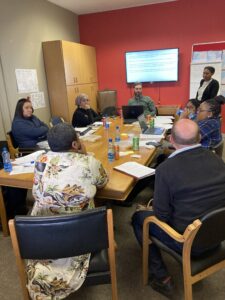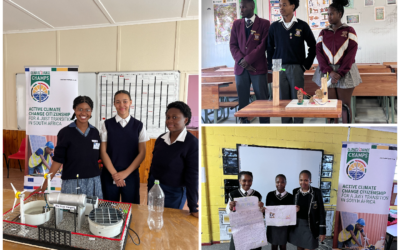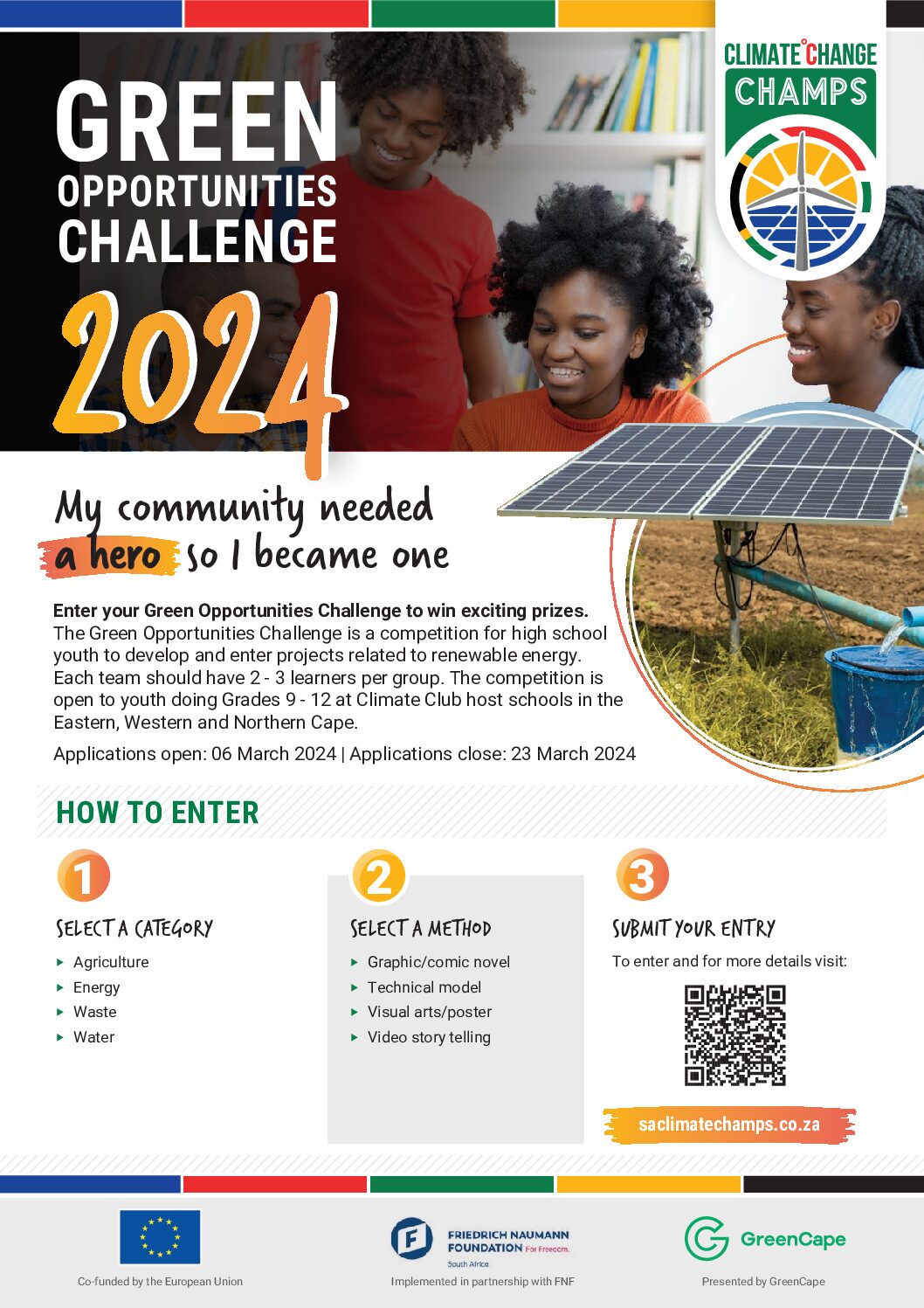
On 13 October 2022, the SA Climate Change Champions held a Green Economy Awareness Learning Series with officials from the Saldanha Bay Local Municipality to learn about policy development and renewable energy.
 We also explored the existing national policies and the relevant local policies and initiatives that would be relevant inputs into the development of a Renewable energy policy. Representatives present were from varying departments in the municipality namely, Electro Engineering, Environmental and Heritage, Local Economic Development, Infrastructure development and Engineering and Support services departments.
We also explored the existing national policies and the relevant local policies and initiatives that would be relevant inputs into the development of a Renewable energy policy. Representatives present were from varying departments in the municipality namely, Electro Engineering, Environmental and Heritage, Local Economic Development, Infrastructure development and Engineering and Support services departments.
The workshop discussed South Africa’s Energy Landscape, talked about challenges faced on a municipal level and how officials can contribute to creating an enabling environment for renewables within their areas of influence. The session took a deep dive into background and types of renewable energy available. The types of potential renewable energy transactions and how to start the process to think through the development of a renewable energy policy.
There was a dynamic discussion session led by Mr Johan Strydom (GreenCape’s Energy Expert Analyst) on the background to policy development, defining the problem and potential options, wireframe renewable energy policy and the ideas to generate electricity. There is still a lot of work to do, but both inter departmental insights and external macro considerations made the workshop a valuable first step in thinking through what a renewable energy policy would look like at Saldanha bay Municipality. However, what stood out was that quite a lot of awareness raising needs to be done both internally and externally.
In the interim, please see the policy below definitions.
|
is passed by a Municipal Council since the Constitution bestows both the executive and legislative authority on this body in terms of Section 151(2), read together with Section 156(2) of the Constitution. A by- law serves as an original legislation in the context of a municipality. Municipal Councils are constitutionally empowered to pass and administer by-laws on matters listed in Part B of Schedule 4 and Part B of Schedule 5 of the Constitution. |
|
are the systematic collection and objective analysis of evidence of public policies, programmes, projects, functions and organisations to assess issues such as relevance, performance (effectiveness and efficiency), value for money, impact and sustainability and recommend ways forward. |
|
is the process that assists policy makers to make better decisions and achieve better outcomes. Evidence refers to the knowledge base and body of knowledge that is being drawn on and used to inform policy decisions. |
|
is a body of persons who have been elected and who make laws. The collective name for these laws (statutes) is legislation. In South Africa there is the national legislature (Parliament) which makes laws for the whole country on any subject. There are also Provincial Legislatures which make laws for the provinces on certain subjects only, as well as local government legislatures (called Municipal Councils) which make by-laws for their areas also on certain subjects only. |
|
involves continuous collecting, analysing and reporting data on inputs, activities, outputs, outcomes and impacts as well as external factors in a way that supports effective management. It aims to provide managers, decision makers and other stakeholders with regular feedback on progress in implementation, results and early indicators of problems that need to be corrected. Monitoring usually reports on actual performance against what was planned or expected. |
|
can be defined as the organisation’s stated position on internal or external issues. It provides the written basis for an organisation’s operations and informs legislation, regulations and the organisation’s governing document. A policy is typically based on a government’s political priorities, usually contained in the governing party manifesto and part of its programme of action. |
|
is the activity of developing policy generally involves research, analysis, consultation and synthesis of information to produce recommendations. The end product of this process is a policy document reflecting on the policy issue to be addressed, procedures and mechanisms aimed at achieving the strategic thrust of the policy. |
|
is an overarching structure tabulating a set of steps, procedures, principles, values and standards that officials ought to comply with to ensure the realisation of an organisation’s adopted policy. It provides broad and detailed guidelines that are crucial to proper implementation of a policy. An example is the DPME’s National Evaluation Policy Framework (2011) which provides the basis for a minimum system of evaluation across government. |
|
referred to as provincial Acts, is passed by any of the nine Provincial Legislature on areas within the provincial sphere of government, in terms of Section 104, read with Schedules 4 and 5, of the Constitution. |
|
is an authoritative statement by policy makers in response to a societal problem, opportunities and changing circumstances the population is faced with at any given time. Policy contains goals to be pursued and the course of action needed to achieve the goals. Public policy becomes implementable provided the elected policy makers and senior government officials have authorised and legitimised it through a formalised policy development process
|
|
flows and derives from an Act of legislatures It is intended to amplify the content of the original legislation for the purpose of implementation on the part of the policy implementers (i.e. bureaucrats). A designated Minister would be responsible for developing a regulation or regulations based on the content of a piece of legislation. For example, the Minister for Health may decide to develop a regulation based on the Health Practitioners Act. |
|
refers to an ex ante policy analysis tool for assessing impacts and likely costs and benefits of the proposed regulatory propositions including, public policies, legislation, regulations and other highly impactful regulatory instruments. |
|
refers to law written down in statutes, parliamentary and provincial Acts, by-laws, proclamations, regulations and other subordinate legislation. |
|
A tool that describes a process of planned change, from the assumptions that guide its design, the planned outputs and outcomes, to the long-term impacts it seeks to achieve. |
|
Renewable energy is energy that is collected from renewable resources that are naturally replenished on a human timescale. It includes sources such as sunlight, wind, the movement of water, and geothermal heat |
|
A generator connected to the municipal distribution network. These are typically on a customer’s property and behind their meter. |
|
The maximum amount of electricity, measured in kilovolt Amperes (kVA), which can flow out of the generation equipment into the customer’s alternating current wiring system. This is therefore the maximum alternating current power flow which can be generated by the system in its current configuration. |
|
A small-scale embedded generator is an embedded generator with a generation capacity of less than or equal to 1000 kVA (1MVA). |
|
Independent power producer, is a private generator operating in the South African grid |
|
Power purchase agreement is a contract entered between a customer and an independent power producer |
|
Customer who purchased the energy produced by an IPP and governed by PPA |
|
Municipality purchasing power |
|
A generation means that offset the energy use of the facility or customer |
|
The financial transactions representing the transportation of third-party electrical energy (kWh) over the distribution network which allows for the third-party supplier to sell this electrical energy to a customer at that customer’s point of supply. |
Please contact GreenCape’s energy sector desk for more information here.

